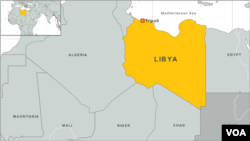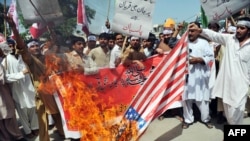The United States has temporarily withdrawn more staff from its embassy in the Libyan capital for security reasons, but said it hopes to return them to Tripoli early next week.
A senior U.S. official, speaking in New York where Secretary of State Hillary Clinton is attending the U.N. General Assembly, declined to say how many staff were being withdrawn or discuss specifics.
Earlier this month, the U.S. ambassador to Libya and three other Americans were killed in an assault on the U.S. consulate in the eastern city of Benghazi,
The incident took place on the anniversary of the September 11, 2001 terrorist attacks in the United States as thousands of Muslims were protesting an anti-Islam video produced in the U.S.
Terrorist attack
Defense Secretary Leon Panetta said there can be no doubt the deadly assault in Benghazi was a planned "terrorist attack." Panetta said an ongoing investigation into the attack has yet to determine which group was involved and whether it has links to al-Qaida.
Libyan Prime Minister-elect Mustafa Abushagur said Thursday the investigation is progressing, but added there was no "complete definite investigation to say who did this yet." He said the Libyan and U.S. governments were closely cooperating on the investigation.
Sept. 11 Protesters attack U.S. embassy in Cairo, Egypt and U.S. Consulate in Benghazi, Libya. U.S. Ambassador to Libya Chris Stevens and three other Americas are killed.
Sept. 12 Anti-U.S. protests spread to several Arab countries.
Sept. 13 Protesters storm U.S. embassy compound in Sana'a, Yemen.
Sept. 14 Protests spread further across Africa, Asia and the Middle East.
Sept. 15 U.S. orders non-essential personnel and families of diplomats out of Tunisia and Sudan.
Sept. 16 Protests continue in several countries.
Sept. 17 A protester dies during a clash with police in Pakistan.
Sept. 18 Protests spread, forcing early closure of U.S. embassy in Bangkok, Thailand
Sept. 19 France plans embassy closures after a French magazine published cartoons of the Prophet Muhammad.
Panetta's remarks come a day after U.S. Secretary of State Hillary Clinton seemed to link al-Qaida's North African branch to the assault at the U.S. diplomatic mission in Libya.
Clinton told a special United Nations meeting on North Africa's Sahel region Wednesday that al-Qaida in the Islamic Maghreb is using the area as a haven to support extremism and terrorist violence in countries like Libya.
The top U.S. diplomat also said American intelligence and law enforcement agencies are increasing their cooperation with regional countries to investigate the September 11 attack in Benghazi.
In her remarks, Clinton did not offer any specific, new evidence to indicate the attack might not have been the local, spontaneous eruption of violence that the administration initially described.
Libyan President Mohammed el-Magarief has also characterized the deadly attack on the U.S. consulate as a "pre-planned attack of terrorism."
From the beginning, Libyan officials have pointed to foreign involvement in the assault, even as they are attempting to crack down on the extremist militias that clearly had a role in the attack.
A senior U.S. official, speaking in New York where Secretary of State Hillary Clinton is attending the U.N. General Assembly, declined to say how many staff were being withdrawn or discuss specifics.
Earlier this month, the U.S. ambassador to Libya and three other Americans were killed in an assault on the U.S. consulate in the eastern city of Benghazi,
The incident took place on the anniversary of the September 11, 2001 terrorist attacks in the United States as thousands of Muslims were protesting an anti-Islam video produced in the U.S.
Terrorist attack
Defense Secretary Leon Panetta said there can be no doubt the deadly assault in Benghazi was a planned "terrorist attack." Panetta said an ongoing investigation into the attack has yet to determine which group was involved and whether it has links to al-Qaida.
Libyan Prime Minister-elect Mustafa Abushagur said Thursday the investigation is progressing, but added there was no "complete definite investigation to say who did this yet." He said the Libyan and U.S. governments were closely cooperating on the investigation.
Timeline: Anti-US Protests
Sept. 11 Protesters attack U.S. embassy in Cairo, Egypt and U.S. Consulate in Benghazi, Libya. U.S. Ambassador to Libya Chris Stevens and three other Americas are killed.
Sept. 12 Anti-U.S. protests spread to several Arab countries.
Sept. 13 Protesters storm U.S. embassy compound in Sana'a, Yemen.
Sept. 14 Protests spread further across Africa, Asia and the Middle East.
Sept. 15 U.S. orders non-essential personnel and families of diplomats out of Tunisia and Sudan.
Sept. 16 Protests continue in several countries.
Sept. 17 A protester dies during a clash with police in Pakistan.
Sept. 18 Protests spread, forcing early closure of U.S. embassy in Bangkok, Thailand
Sept. 19 France plans embassy closures after a French magazine published cartoons of the Prophet Muhammad.
Clinton told a special United Nations meeting on North Africa's Sahel region Wednesday that al-Qaida in the Islamic Maghreb is using the area as a haven to support extremism and terrorist violence in countries like Libya.
The top U.S. diplomat also said American intelligence and law enforcement agencies are increasing their cooperation with regional countries to investigate the September 11 attack in Benghazi.
In her remarks, Clinton did not offer any specific, new evidence to indicate the attack might not have been the local, spontaneous eruption of violence that the administration initially described.
Libyan President Mohammed el-Magarief has also characterized the deadly attack on the U.S. consulate as a "pre-planned attack of terrorism."
From the beginning, Libyan officials have pointed to foreign involvement in the assault, even as they are attempting to crack down on the extremist militias that clearly had a role in the attack.







